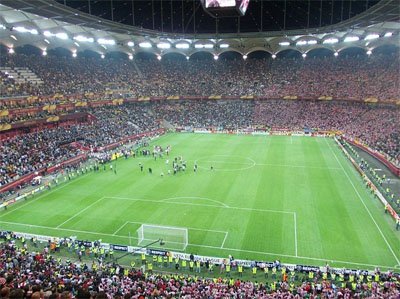Athletic Club (Athletic Bilbao)

|
| The 2012 final in Europa League against Atlético Madrid. |
Athletic Club — History, Identity & The Basque Football Legacy
Origins — The Birth of Basque Football (1898–1902)
Athletic Club was founded between 1898 and 1902 by local Basque students and British workers who brought football to northern Spain. Football spread quickly across Bilbao, and Athletic became one of the earliest and strongest clubs in the country. Their identity was built around teamwork, physicality, and the proud spirit of the Basque people.
Early Dominance — Cup Kings of Spain (1903–1930)
Athletic dominated early Spanish football, winning multiple Copa del Rey titles in the 1900s and 1910s. Their all-Basque squads overwhelmed opponents with intensity and unity. By the 1920s, Athletic were recognized as the strongest force in northern Spain and a cornerstone of Spanish football culture.
San Mamés — “La Catedral” (1913–Present)
In 1913, Athletic inaugurated San Mamés, a stadium that would become known as “The Cathedral of Football.” With its intimidating atmosphere, passionate supporters, and sacred place in Basque culture, San Mamés represents the heart of Athletic Club. The modern stadium, opened in 2013, retains the same powerful identity.
The Basque-Only Philosophy — A Unique Tradition
Athletic Club follows a philosophy like no other club in the world: they only field players who are born in the Basque Country or developed in Basque youth systems. This “cantera” approach is a symbol of Basque pride, regional identity, and local football development. Despite this strict rule, Athletic has remained consistently competitive in La Liga without relying on foreign recruitment.
La Liga Founders & Early League Success (1929–1930s)
Athletic Club was a founding member of La Liga in 1929 and quickly established themselves as a major force. They won multiple league titles and continued their Cup dominance, setting the tone for a golden era of Basque football.
Post-War Strength — Iribar & Legendary Teams (1950s–1970s)
The mid-20th century produced unforgettable chapters in Athletic history. Players like José Ángel Iribar became national icons, and the club continued winning major trophies, including multiple Copa del Rey titles. This era reinforced Athletic’s identity as a powerhouse built on defensive strength, local talent, and loyal supporters.
The Golden 1980s — Back-to-Back La Liga Champions
Under Javier Clemente, Athletic enjoyed one of the greatest eras in club history:
• La Liga Champions 1982–83
• La Liga Champions 1983–84
• Copa del Rey 1984
Winning the league twice in a row — with an all-Basque squad — remains one of the most historic achievements in Spanish football.
Modern Era — European Football & Consistent Top-Flight Presence
Remarkably, Athletic Bilbao has never been relegated from La Liga (same as Real Madrid and FC Barcelona). The club continues to compete in Europe, reach Copa del Rey finals, and produce elite talents such as Fernando Llorente, Iker Muniain, Aymeric Laporte, and Inaki Williams.
Basque Identity — Culture, Pride & Unbreakable Unity
Athletic Club is more than a football team. It is a cultural symbol, a guardian of Basque traditions, and a living example of loyalty in modern football. Their dedication to the cantera, community, and heritage makes them a global football icon.

Athletic’s crest features the symbols of Bilbao and Biscay: wolves, the church of San Antón, the bridge, and the iconic tree of Gernika. It represents Basque heritage, unity, and strength.
